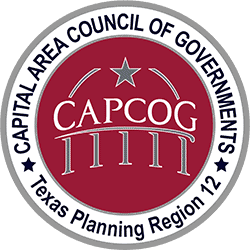Home » Divisions » Regional Planning & Services » Geographic Information Systems
Geographic Information Systems
The CAPCOG Geographic Information Systems (GIS) Program is responsible for the coordination, aggregation, quality control, administration, and publication of GIS services throughout the 10-county region. This includes database maintenance supporting 9-1-1/emergency communications and managing a cooperative base map purchasing program for region participants. GIS Data Services includes free regional GIS data, value-added data, and data products generated from the GeoMap Program, namely orthoimagery for the entire region.

GIS Committees
CAPCOG coordinates two GIS-focused committees that meet quarterly and have an ongoing dialog on important regional GIS issues —The Geographic Information Systems Planning Council (GISPC) and the GIS & Maps User Group (GMUG).
Programs
The CAPCOG GIS Program manages several ongoing programs and committees that contribute to the geospatial evolution in the region. Among those programs are the 9-1-1 GIS Database Program and the GeoMap Program.
9-1-1 GIS Database Program
CAPCOG’s GIS Program is responsible for the coordination, aggregation, quality assurance and quality control, maintenance and publication of GIS services consumed by Public Safety Answering Points (PSAP) across the region. The GIS services are currently used to display regional-wide comprehensive maps for Emergency Call takers updated on a monthly basis. GIS task services also are hosted and served by the CAPCOG GIS Program for 9-1-1 calls to be automatically plotted on the maps.
CAPCOG also maintains GIS services for 9-1-1 call takers to use various functionalities on their call operation maps. CAPCOG GIS spearheads the effort to transition from the enhanced 911 system to the Next Generation 911 system in collaboration with Bexar Metro 911 District. The GIS team assists in 9-1-1 database improvements to achieve the current 99 percent match rate for active landline and VoIP phone numbers consisting of more than one million records.
CAPCOG Emergency Locator Map
This mapping application for mobile devices was a project driven by emergency responders and managers “in the field” who desired to use the same data and maps as 9-1-1 call takers, county and city address coordinators, and GIS staff throughout the region. The application provides more consistency in communications and feedback from the field to improve the databases serving these maps. The primary goal for this application is for emergency responders in the field to locate addresses on the map quickly and accurately.
CAPCOG is coordinating the testing phase of the Emergency Locator Map app and is encouraging potential users of this application to try it out, live or simulated. Providing feedback will help the CAPCOG GIS Program improve the application to better support the region’s first responders. First responders can access the User Guide and Testing Feedback[MISSING] website while using the Beta version of the application on the feedback website.
Capital Area Orthoimagery Projects
CAPCOG’s orthoimagery projects, formerly known as the GeoMap Program, provides and maintains the region’s need for geospatial base-map data through a cooperative purchasing measure that receives volume discounts for the greatest geographic coverage.
Base-map data for the region is generated from CAPCOG’s orthoimagery, or aerial imagery, projects. The imagery can either be obtained through the Texas Natural Resources Information System (TNRIS) Strategic Mapping program or by contacting CAPCOG.
GIS Analytical Services
The CAPCOG GIS Program is available to work on GIS projects with communities, businesses or nonprofits at various levels of engagement. Labor fees are typical for smaller projects, and contract or grant based fees are typical for larger projects. Projects may entail the use of other CAPCOG specialty areas, namely community and economic development, transportation and regional planning, air quality, solid waste and others. GIS analytical services typically include some combination of
- data acquisition or generation,
- spatial analysis, or
- mapping/cartography.
Contact Rob Buckhouse, GIS Program Manager, for more information about analytical services.
GIS Data Services
CAPCOG offers a host of GIS data useful for mapping and spatial analysis purposes. Tabular data also is available.
Free Maps & Data
This section provides a host of downloadable free regional GIS data. Some general reference maps in PDF format are also available.
Statistics & Publications
CAPCOG’s Planning and Economic Development and Regional Services divisions acquire or generate statistical data and produce meaningful analysis for a variety of projects that contribute to regional objectives.
